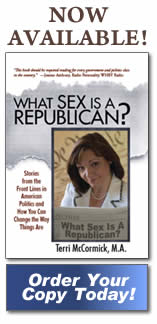 In the world of political manipulation, stereotypes of ethnicity, gender and religion pose would-be barriers in the minds of some of the voting public. When these stereotypes are used in conjunction with insider political class/fish-tank politics or “food for favors,” corruption becomes the culture. Simply, the partisan bickering and rancor creates an illusion to most of us in the general public, clouding the reality of ego and power needs of the front row. Politics presents an equal party opportunity for greed, corruption and power mongering—call it tomfishery in the ecosystem.
In the world of political manipulation, stereotypes of ethnicity, gender and religion pose would-be barriers in the minds of some of the voting public. When these stereotypes are used in conjunction with insider political class/fish-tank politics or “food for favors,” corruption becomes the culture. Simply, the partisan bickering and rancor creates an illusion to most of us in the general public, clouding the reality of ego and power needs of the front row. Politics presents an equal party opportunity for greed, corruption and power mongering—call it tomfishery in the ecosystem.
When we oust one political party from the power to distribute scarce resources to their respective constituencies, all we are doing is bringing onto the scene another political machine that will call the same political plays. The net gain in this change is zero. Social and economic issues are bantered about, creating an ideological illusion for Republican and Democratic followers—the outcome appears to be the same. What’s more, unless we break this perpetual cycle of changing one political machine for another, there is no hope for change. One front row alternative to this status-quo political ecosystem is the same as the other. The kind of change we need can be brought about by electing people more willing to swim upstream, against the front rows.
BARRIERS OF ETHNICITY AND GENDER
Our 2008 presidential race created an opportunity for all of us to examine not only gender but ethnicity with the highest level of politics. We were having serious and frank discussions for the first time in American history, facing our fears and misperceptions of race, gender and leadership. Senator Barack Obama didn’t appear to meet the mark of any of this nation’s preconceived notions of what a presidential candidate should be. Governor Sarah Palin didn’t appear to meet the nation’s notion of what a vice-presidential candidate should be.
Obama was characterized as inexperienced and too young to hold the position of president of the United States. Attack ads in his Democratic primary were “soft” ads, asking “Who is best suited to pick up the telephone?” Barack Obama’s childhood was a challenging one, with an admission of some youthful drug use. Due to his admissions in a biography, Obama has faced stereotypes in the form of personal smears and rumors that did not stick. Perhaps the most potentially damaging stereotype was that his father was a Muslim and his pastor was a radical against whites. His high-road strategy, however, staying away from the fight, served him well.
Sarah Palin was characterized as inexperienced and too young to hold the position of vice president of the United States. Smear campaigns by the Democratic party were aggressive and genderfocused. “Who is taking care of her small children at home?” ads asked, and noted “She does not have a passport.” Initial polling suggested that Governor Palin saved the McCain presidential ticket. The only certainty about this historic election year was that the pundits have been wrong in both primaries, and they were wrong about the mass support a woman could garner on the GOP ticket.
The 2008 campaign marked the first time in American presidential campaign history that a major political party chose an African- American man and the second time in history that a woman was placed on the ticket as vice president. Both candidates confronted our fears and stereotypes of race and gender. The election of 2008 offered an opportunity for all African Americans to see themselves in the face of Barack Obama. And to a great extent, the selection of a woman by the GOP broke an even more profound gender barrier. The gauntlet was thrown, challenging all of us to move past the stereotypes of the past. It is only then that we may have one nation, looking to the future of our United States of America.
To continue reading this book, get your copy of “What Sex is a Republican” in paperback or Kindle edition on Amazon.
About the Author:
Terri McCormick is an author, policy expert, educator, and former state representative to the Wisconsin State Legislature. Today, she offers her expertise in public and government relations through McCormick Dawson CPG Ltd., a trusted consultancy of independent contractors.
Ms. McCormick serves as president and CEO of the company, drawing from more than two decades of professional experience, a strong educational foundation, a host of industry-related publications, and a multitude of accolades, awards and formal recognitions. Holding a Master of Arts in administrative leadership from Marian University, and a Bachelor of Science in political science and public administration from the University of Wisconsin, Ms. McCormick received both degrees with high honors.
“What Sex is a Republican?” is sold on Amazon in both the paperback edition as well as Kindle edition. Read reviews on Amazon here.




@mikeallen @morningmika http://t.co/W6nDssITy1